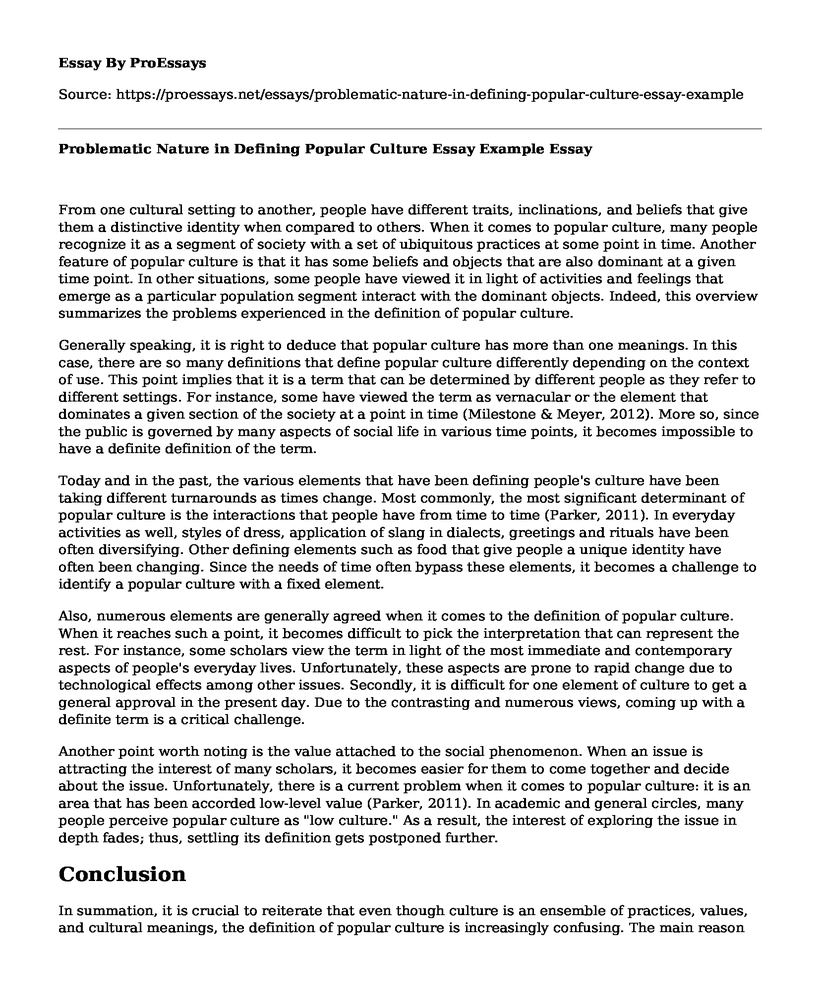From one cultural setting to another, people have different traits, inclinations, and beliefs that give them a distinctive identity when compared to others. When it comes to popular culture, many people recognize it as a segment of society with a set of ubiquitous practices at some point in time. Another feature of popular culture is that it has some beliefs and objects that are also dominant at a given time point. In other situations, some people have viewed it in light of activities and feelings that emerge as a particular population segment interact with the dominant objects. Indeed, this overview summarizes the problems experienced in the definition of popular culture.
Generally speaking, it is right to deduce that popular culture has more than one meanings. In this case, there are so many definitions that define popular culture differently depending on the context of use. This point implies that it is a term that can be determined by different people as they refer to different settings. For instance, some have viewed the term as vernacular or the element that dominates a given section of the society at a point in time (Milestone & Meyer, 2012). More so, since the public is governed by many aspects of social life in various time points, it becomes impossible to have a definite definition of the term.
Today and in the past, the various elements that have been defining people's culture have been taking different turnarounds as times change. Most commonly, the most significant determinant of popular culture is the interactions that people have from time to time (Parker, 2011). In everyday activities as well, styles of dress, application of slang in dialects, greetings and rituals have been often diversifying. Other defining elements such as food that give people a unique identity have often been changing. Since the needs of time often bypass these elements, it becomes a challenge to identify a popular culture with a fixed element.
Also, numerous elements are generally agreed when it comes to the definition of popular culture. When it reaches such a point, it becomes difficult to pick the interpretation that can represent the rest. For instance, some scholars view the term in light of the most immediate and contemporary aspects of people's everyday lives. Unfortunately, these aspects are prone to rapid change due to technological effects among other issues. Secondly, it is difficult for one element of culture to get a general approval in the present day. Due to the contrasting and numerous views, coming up with a definite term is a critical challenge.
Another point worth noting is the value attached to the social phenomenon. When an issue is attracting the interest of many scholars, it becomes easier for them to come together and decide about the issue. Unfortunately, there is a current problem when it comes to popular culture: it is an area that has been accorded low-level value (Parker, 2011). In academic and general circles, many people perceive popular culture as "low culture." As a result, the interest of exploring the issue in depth fades; thus, settling its definition gets postponed further.
Conclusion
In summation, it is crucial to reiterate that even though culture is an ensemble of practices, values, and cultural meanings, the definition of popular culture is increasingly confusing. The main reason behind this issue is the fact that many agreeable definitions satisfy what popular culture incorporates. Secondly, the elements that can define what popular culture typifies have been changing over time. The other contributing factor to this problem is the fact that it is perceived as low culture: this reduces interest in the academic circles which give many cultural elements exact definitions.
References
Milestone, K., & Meyer, A. (2012). Gender and popular culture. Cambridge, UK: Polity.
Parker, H. N. (2011). Toward a definition of popular culture. History and Theory, 50(2), 147-170.
Cite this page
Problematic Nature in Defining Popular Culture Essay Example. (2022, Oct 20). Retrieved from https://proessays.net/essays/problematic-nature-in-defining-popular-culture-essay-example
If you are the original author of this essay and no longer wish to have it published on the ProEssays website, please click below to request its removal:
- Research Paper on Marriage, Kinship, and Family
- Korean Wave Essay
- Essay Example on Popular Culture in the Age of Social Media
- Essay Sample on Adele, Beyonce, and the Outcome of Grammy and Emmy Award Competitions
- Essay Example on From Tradition to Modernity: Footbinding in China (1839-1911)
- Essay Example on Exploring Canadian and Indigenous Families: Intersectional Analysis
- Free Research Paper Sample on Child Development: Mastering Skills & Gaining Knowledge







